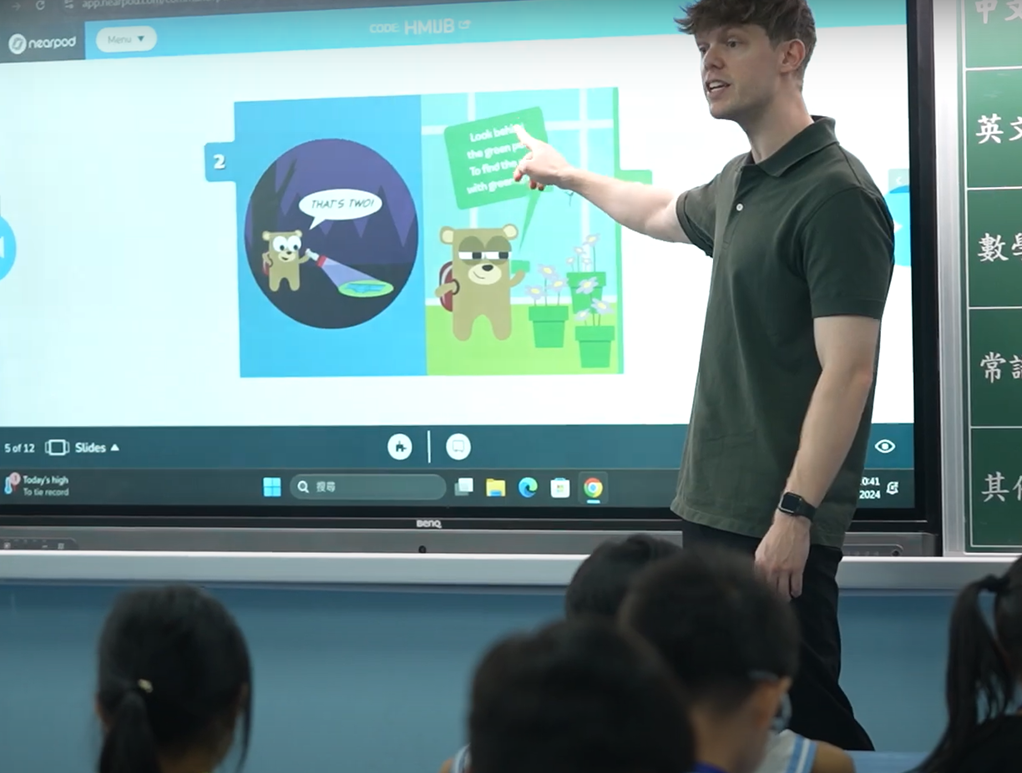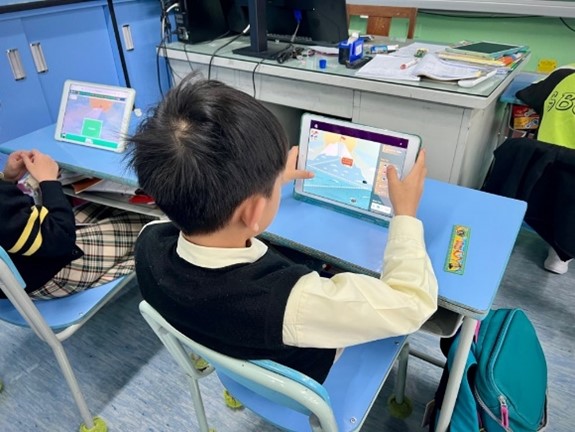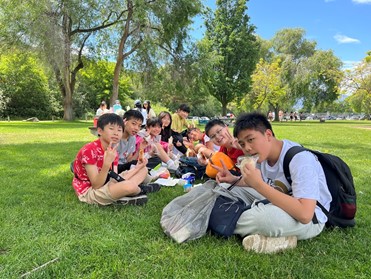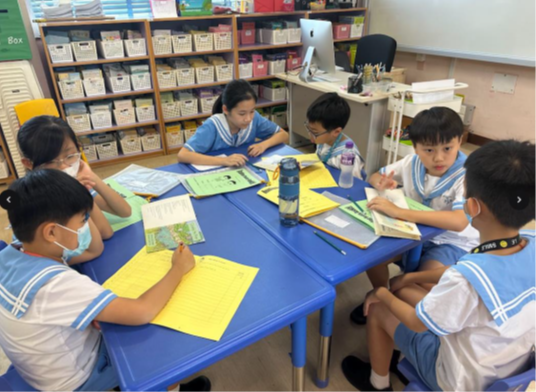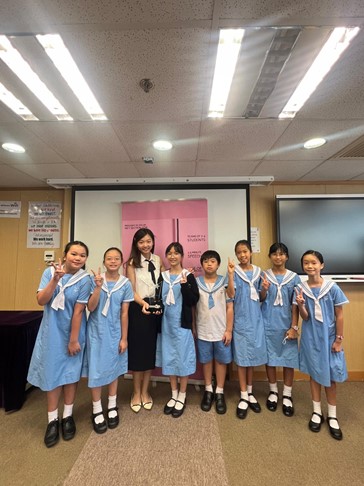English
English

Aims
- To improve students’ creativity and critical thinking skills in English
- To cater for learners’ diversity and promote self-directed learning
- To develop students' English language proficiency and competency through authentic learning experiences
- To adopt a Balanced Literacy Approach in the teaching of English by designing activities and lessons which will help students to develop their reading, writing, listening, speaking, viewing and representing skills
- To teach the 12 reading comprehension strategies and encourage students to develop the love of reading
- To teach the 6 traits of writing
- To improve students’ writing skills through process writing and other writing tasks
- To focus on interactive learning experiences, e.g. provide opportunities for students to enhance their English skills through a variety of interclass and school-wide English activities (Speech Festival, Poetry Café, Spelling Bee, and inter-school competitions)
- To prepare our students for higher education
Reading Programme
|
|
|
NET Section
P1-P3 students have the opportunity to enjoy two lessons which are co-taught by the NET and LET per cycle. The NETs mainly focus on High Frequency Words, Phonics, Shared Reading and Guided Reading. Guided Reading for P1-2 students is carried out in small groups with a ratio of 1:7. Another aspect of the NET Section is to increase their confidence in speaking using a variety of fun activities.
Enjoy the fun English activities that we do in our school. Don’t forget to visit our Google Classroom (NET Section@SBCPS) (For current students only.) to check out cool resources and participate in the interactive activities just for you!
Phonics (P.1-P.3)
Students learn the sound symbol relationship of words and they learn to decode words for meaning. To develop phonemic awareness, the sounds are introduced in NET lessons and then further reinforced by the LETs. Phonics is taught in context so that students can practice blending sounds and decode meaningful words and sentences. In this way, they begin to READ.
|
|
|
Ability Grouping
Students are grouped according to their abilities. On the one hand, there is the core curriculum which is the basic foundation at each level. On the other hand, there is the school-based curriculum which is created in order to cater for learner differences. Since pupils are placed into different classes according to their abilities, weaker students have more support from their teachers as well due to a smaller class size.
|
|
|
E-learning
Application of e-learning technology helps promote an efficient, effective and productive way of teaching. It promotes better communication and helps teachers and students to share accountability for learning and achievements. A variety of platforms are used to connect students with their learning and provide various ways for them to respond and reflect. Having access to such platforms help students’ development including positive self-directed learning.
|
|
|
Experiential Learning
Experiential learning offers students the opportunity to engage in hands-on experiences that go beyond traditional classroom settings. By participating in activities such as experiments, field trips, and real-world projects, students can apply their knowledge in practical ways, fostering a deeper understanding of the subject matter.
|
|
|
P.1 Pets Day
P1 students recently had an exciting Pets Day event where teachers and students were encouraged to bring their beloved pets to school. This hands-on experience allowed students to interact with pets, touch them, and observe them up close. With the help of parent volunteers, students had the opportunity to learn about different types of pets and their care needs. Meeting real pets not only sparked joy and curiosity among the students but also provided a valuable experiential learning opportunity where they could see firsthand how to interact with and care for animals in a safe and supervised environment.
|
|
|
|
|
|
P.2 Visit to Wetland Park
Hong Kong Wetland Park is a world-class ecotourism facility that demonstrates the diversity of Hong Kong's wetland ecosystem and highlights the need to conserve them. With the visit to the Wetland Park cooperating with the school moral team, students can appreciate the beauty of nature and explore the amazing wildlife.
|
|
|
P.2 Visit Police Station
Students visited the Wong Tai Sin Police Station, where they had the opportunity to meet police officers and to explore the various facilities within the station. During their visit, students engaged in informative discussions and had the chance to ask questions about the daily responsibilities of officers. This activity was a cross-curriculum activity which cooperates with General Studies, allowing students to learn about the vital role that law enforcement plays in their community. Through this experience, they gained a deeper understanding of the importance of national security and the people dedicated to protecting them.
|
|
|
P.3 Smoothie Making
After our P3 students have learnt about recipes, students were engaged in smoothie making. This hands-on activity allows students to apply their knowledge in a practical and enjoyable way. This experiential learning opportunity not only reinforces their understanding of recipes but also fosters creativity and collaboration with peers.
|
|
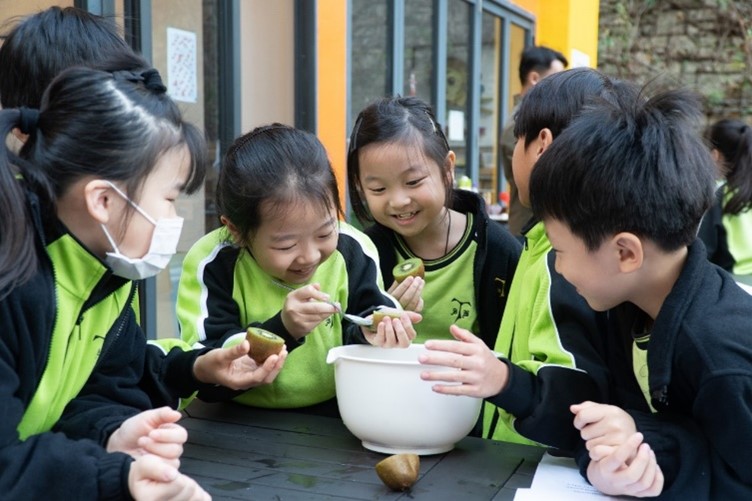 |
|
|
|
P3 Outing to Nan Lian Garden
We offer students the opportunity to learn in an immersive way, for example, an outing to Nan Lian Garden for P3 students. By actively participating in activities that stimulate the five senses, students can better retain information and gain a deeper understanding of the concepts being taught. After the trip, students shared their unforgettable moments and experience by writing a diary entry!
|
|
|
P4 Mai Po Visit
Students visited Mai Po, a renowned wetland area, to explore its rich biodiversity and unique ecosystem. This excursion exposed P4 students to an authentic learning environment where they observed various plants and wildlife in their natural habitat. Guided tours and interactive activities highlighted the importance of conservation, enhancing their understanding of environmental science while introducing them to one of Hong Kong's key tourist attractions.
|
|
|
P5 English Camp
The primary aim of the camp is to enhance students' confidence in speaking English by immersing them in interactive games and teamwork activities. These activities involve friendly competition and collaborative tasks to strengthen the students as a unified team. Students are encouraged to actively use English to reach their objectives, fostering engagement and courage. Throughout the camp, students can discover new experiences, cultivate independence, and enjoy themselves while engaging in thrilling activities and mastering the English language.
|
|
|
|
|
|
Activities
English Drama
Drama builds confidence, helps concentration, develops language and communication skills, encourages children to cooperate, helps them to understand the world around them and develops creativity. Our school participates in the Hong Kong School Drama Festival and a team of students and teachers prepare for the final performance.
|
|
|
|
|
|
P5& P6 Canada Summer Camp
Cultural exposure is essential for students to grow and flourish. To encourage students to learn English, a selection of P.5 to P.6 students are sent off to Canada during the summer of every year to take part in activities in an immersive English environment. Students actively participate in interactive English lessons with native speakers followed by a variety of outdoor activities such as kayaking, visiting museums and picking fruit. After the programme, students have gained a wonderful experience to express what they have learned throughout this journey in front of all audience.
|
|
|
|
|
|
Study tour to Ireland
Students embarked on a study tour to Ireland, where they explored and appreciated the rich Irish culture, history, and traditions. They visited historical sites, engaged with local communities, and participated in traditional Irish activities. This immersive experience not only deepened their understanding of Ireland's heritage but also enhanced their global awareness, fostering a greater appreciation for diverse cultures.
|
|
|
|
|
|
Buddy Reading
Reading is one of the essential elements to effective learning and a way in which students can discover their interests in a particular topic(s). We have a Buddy Reading system where students from the upper levels are paired with the lower levels to read during lunch time. Our English Ambassadors also hold reading-related activities for our students.
|
|
|
Our English Ambassdors
We offer a variety of internal and external English activities so as to expose our students and create a language rich environment for their learning. Writers’ Conference, Board Games, Thematic Stall Games, Interactive Activities, Songs, Spelling Bees, Poetry Cafe are some of the many activities that aim to motivate students to learn English and explore the fun of learning the language.
|
|
|
|
|
|
Competitions
We encourage students to take part in various competitions to showcase their talents. Some of these competitions include Hong Kong Schools Speech Festival (Solo Verse Speaking, Prose Reading, Choral Speaking), Storytelling Competition and Story writing Competition. Our school proudly achieved first place in both the Choral Speaking and FilmIt Competitions, showcasing our students' talent and dedication.
|
|
|
|
|
|
Our Team

Third Row: Ms Jiao Jiao, Ms Lo Wing Yan, Mr Adrian Clavijo, Mr Brown Benjamin, Mr Jack Hackett, Mr Hui Charn Lam, Mr Tam Ming Yat Jonathan, Mr Cheung Man Lok
Second Row: Ms Tse Sin Kei, Ms Kwok Man Yan, Tong Pui Fung, Ms Ho Yin Chiu, Ms Wong Pak Ngan, Ms Ho Yat Ping
First Row: Ms Leung Ching Yi, Ms Leung Ho Yung, Ms Yeung Pui Sze, Ms Tse Tsz Ching, Ms Ng Mei Ha, Ms Lau Man Ching, Ms Chow Chi Ching




